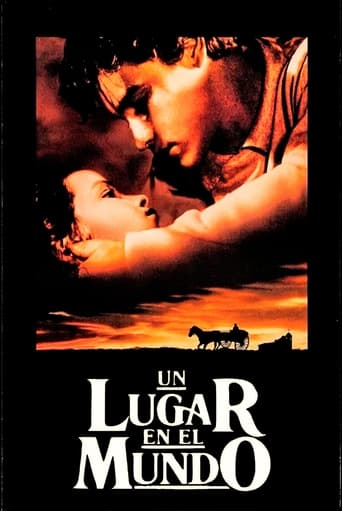MartinHafer
Up until the 1980s, films from Argentina were heavily censored by their rightist government and films critical of the system were unheard of in this country. However, when this government fell, many films critical of this old system began to proliferate and the most famous of these internationally was "The Official Story"--which won the Oscar for Best Foreign Language Film. "A Place in the World" debuted a few years later but was not submitted by the Argentines for this award--and so the filmmakers tried submitting it was a Uruguayan film! Later, the film was disqualified, since it WAS from Argentina and was about the country--a very odd footnote, as it's only one of two films every removed from consideration after submitted to the Academy.When you watch "A Place in the World", you might not see that the message is political--and it's not nearly as obvious as in "The Official Story". Instead of being directly critical of the federal government, the film is a socialist commentary about the abuse of the landlords and the need for the common men to work together to receive equality. In this case, a jerk rich guy is intent on buying up all the farmers' wool at HIS price...or else. However, when a German geologist arrives in town, the local agitator (the school teacher) is encouraged to fight back for what is right. At the same time, the story of a sympathetic nun is a metaphor for the traditional relationship between the church and state in the land. The story is told as a flashback from the teacher's teenage son's point of view and unfolds slowly and beautifully. The acting is nice but the direction is the star to me. Well worth seeing.
runamokprods
Interesting, thoughtful mix of two genres – a coming of age film that's sweet, nice, (if occasionally a touch sappy), and a deeply moving, complex political morality play about the price one pays for trying to live by one's ideals. Two leftists, almost killed by the Argentine generals, raise their son in the backwoods, trying to help organize the people there against the local land baron. Into their lives comes a charismatic, sympathetic, but cynical geologist, unhappily working for the land owner, but unable to buy into his new friends' idealism, leading to all sorts of emotional and plot complexities.I'd like to re-see this, and I could imagine rating it even higher, but the over the top score, and few more clichéd elements stopped me from really flipping out for it, while still finding it a solid, strong, thought-proving film.
ex-x-treme
I got to see this movie by chance after reading an interview to Cecilia Roth in La Nacion online newspaper. When asked for her favorite film, she mentioned "Un Lugar en el Mundo". This movie, as suggested in many places, it's as good (or better) as "La Historia Oficial", which is one of the best Argentine movies ever. Personally, I liked this one more. It's a very warm movie about the the relationships of the characters between themselves and with the place they inhabit. Certainly, the place to shoot it was chosen wisely. Argentinian pampa and Patagonia desert have a special appeal, very difficult to describe unless you visit them, some kind of special magic. The movie depicts also the strong gravitational effect that the Catholic Church has in Argentinian culture, mostly in the countryside. As you will see around the movie, besides the frequently shown green ford falcon, diesel train, horse carriage and old ambulance, the other constant are the gatherings in or around the church. A very strong recommendation if you liked "Un Lugar en el Mundo": "Historias Minimas". This is movie shares the same type of narrative it's about human relationships of a group of people in Puerto San Julian, an Atlantic town down south in Patagonia. The difference is that Un Lugar en el Mundo has a very heavy duty cast, all consummated actors and actresses. Historias Minimas only relatively known actor is Javier Lombardo, the rest are mostly first time plays.
ElianaM
I think, and most Latin American critics agree, that A PLACE IN THE WORLD runs neck and neck with the Oscar winning OFFICIAL STORY as Argentina's greatest movie ever. This movie shows the maturity that Argentine cinema began to reach after the mid 80's Oscar winner, mentioned above. The wounds left in Argentina by the events depicted in THE OFFICIAL STORY are still there. They are in fact a central theme of this film, which shows vivid signs of these scars beginning to heal. The film also brings Cecilia Roth back from exile (in real life as well as in the film), and cements her partnership with Federico Luppi as the 90's equivalent of Norma Aleandro and Hector Alterio, who were the couple of the 70's and 80's. In fact, Roth and Luppi and this film's director went on to collaborate on another landmark Argentine film of the 90's (MARTIN HACHE), and Roth and Luppi have continued to appear on the screen together since. This film may be their greatest collaboration, but their acting is not the only reason to see this film. Life in the interior of Argentina's provinces was never so well portrayed and explored. And challenges that Argentina and indeed, all Latin American countries face are well addressed. A must see.



